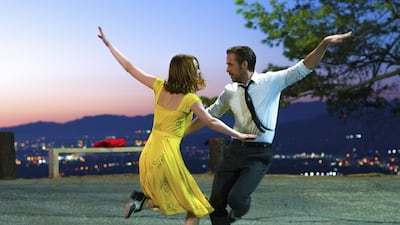Someone – I forget who – once described musicals as "a series of calamities, at the end of which everyone has a party". And this has been the accepted formula for writing a successful showbiz songfest for nearly a century – from Guys and Dolls through to La La Land, the newest incarnation of the genre and one that has garnered a record-equalling 14 nominations for the Academy Awards.
A series of calamities sometimes seems to sum up my own career in show business. As for the promised party, this week my wife announced that to celebrate my imminent 60th birthday she was taking me to see La La Land.
The idea of sitting in the dark watching other, younger and more successful actors than me warbling and prancing their way through two hours of kitsch boy-meets-girl romcom was surely not what I needed as I pondered the arrival of my senior citizens’ free bus pass in the post the next day. At least, that’s what I thought as the lights dimmed and the music struck up. Yet I, of all people, should have known better.
What is it about musicals that lifts our spirits when nothing else can? The weather may be ghastly, the political situation terrifying, and the tax man banging at the door – yet offer up a few show tunes, a twirl or two and a happy ending to cap it all off, and life seems once more worth the unequal struggle.
I speak from experience, having spent many years performing in some of its most iconic examples, including a year in Kander and Ebb's toe-tapping classic Chicago, two more in Mamma Mia! and a further six months in Stephen Sondheim's Company.
“Strange, how potent cheap music is.” So wrote Noel Coward, who knew a thing or two about composing hit tunes. Indeed, there’s something visceral about a well-crafted lyric and a soaring melody that bypasses the intellect and arrows straight into the bloodstream.
During my time in Chicago I recall only full houses and rapturous receptions; while at the end of each performance of Mamma Mia! – and I did 937 of them – the response was, if anything, even more ecstatic.
However jaded the cast might feel after eight shows each week, the result was always the same when we took our bows, namely the sight of more than 1,000 ecstatic punters standing in tribute, broad smiles stretched across their flushed faces, clapping along in time to a final chorus of that ultimate 1970s pop song (and for many middle-aged punters, the anthem to their lost youth), Dancing Queen. The experience of witnessing so much happiness invariably lifted our spirits up there on the stage. It was a privilege to be part of it.
But joy isn't the only emotion on offer, for the best musicals also have the ability to move and inspire, and to even alter our perception. Think of Showboat, or West Side Story, with their themes of racial segregation and teenage gang culture. And while few shows are as uncomplicated as Mamma Mia!, whenever I recall my stint in the show my thoughts always stray to one scene in particular.
Half way through the second act, on a still Mediterranean night, the heroine, Donna, helps her only daughter Sophie into her wedding dress, before the marriage ceremony that forms the climax to the story. It's a simple conceit – a middle-aged woman contemplating her precious offspring standing on the threshold of adulthood and independence, and all to the accompaniment of one of Abba's most haunting ballads, Slipping Through My Fingers, a song that captures perfectly that sense of both happiness and loss felt by any proud parent.
Yet at many performances the song was received not only in rapt silence, but also to the sound of keening sobs from the auditorium. The theme was a universal and deeply powerful one for anyone who has ever seen their offspring grow up and depart, and now, distilled into a few moments of musical theatre, its potency was obvious.
So what of La La Land? Well, the cast may have lacked the terpsichorean genius of Fred Astaire and Ginger Rogers, and the soundtrack certainly never reached the soaring heights of Rodgers and Hammerstein, and yet I loved it.
Two hours after entering the movie house as a grumpy old man, I emerged with my heart lighter, my spirits soaring and a spring in my step. Who cares that I’m 60? Not me. Why, I’ll even try to smile next time someone offers me their seat on the bus.
Michael Simkins is an actor and writer in London
On Twitter: @michael_simkins

